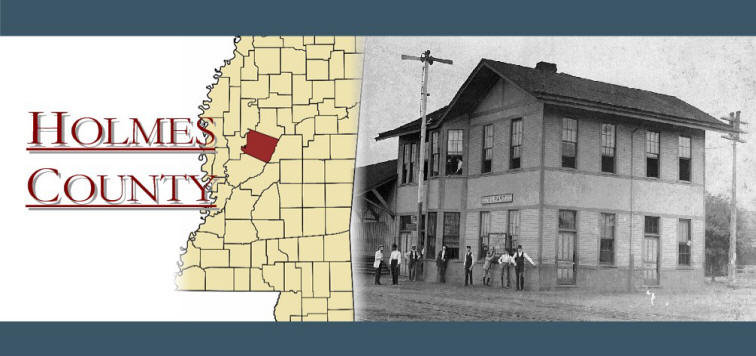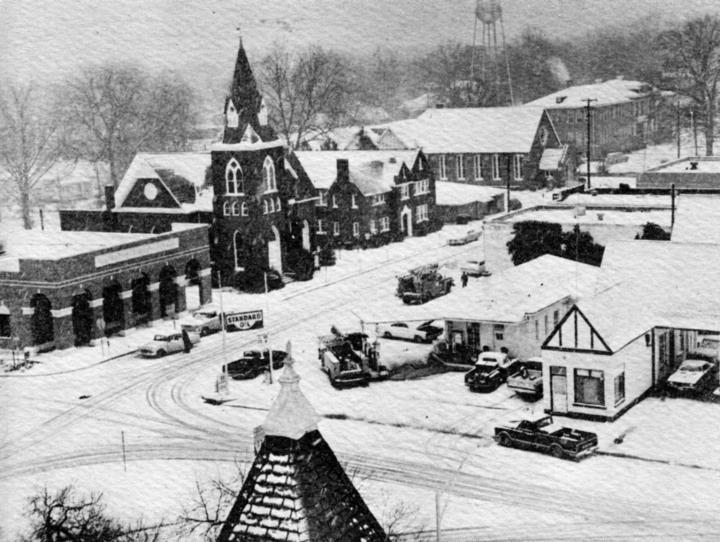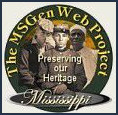Biography of William Taylor's Holmes
County
William Taylor was born in North Carolina and moved to Tennessee when he was in
infant. He spent his childhood in Tennessee near Clarksville. His father moved
the family to Mississippi in 1816 when William was 12. He was sent to school
but didn't go too far before he got a job working in a store. They first settled
in Pike County and then in 1825 or so, he moved his father and mother and a
brand new wife to Yazoo County. This chapter tells what he did in Holmes county
William Taylor was 80 years old when he wrote this journal in 1884. He moved
his family to California
Many thanks to Sally Knutson
Chapter 26
But to return to temporal matters, Bro. John had moved and settled in the
hickory "barrus" near my canebrake settlement, and I saw his crops was far
superior to mine, and that I had been deceived with regards to the richness of
the hickory "barrus" ! I sold my settlement farm, entered some land near my
brother's, went into the woods without a stick missing, built some cabins,
cleared and fenced my farm, plowed and planted all I could the first year,
prepared new land for the second year, planted in corn and planted cotton on the
balance which grew and made a splendid crop.
Here I missed the opportunity to have
speedily made a splendid fortune. There was any amount of vacant land all around
me, but up to this time improved lands could hardly be sold for the improvements
put on them, but in two or three years emigrants (some rich) began to pour in
and land ran up as high as twenty and thirty dollars per acre. I could have
bought all I had money to pay for, at one dollar twenty-five cents. Alas, I
don't know what might have been, but I didn't see far enough ahead, and turned
my cotton in a different speculation.
Ever since I had learned book "ceeping" I had a hankering for the mercantile
business, and I now thought an opportunity had presented itself. There was a
beautiful spot for a town not far from my farm, a good many bold springs
parallel with the town site, easily accessible. This place was several miles
from the nearest village and a sprinkling of settlers all around. Why not build
up a town and commence merchandising?
The idea struck while I was bending my back in the hot sun picking cotton. I
remember it as well as if it was yesterday. I picked up my basket, carried it to
the cotton house and picked no more cotton for a long time afterward.
Well, with a young man I went to take the numbers of the land I wanted to
purchase. While on the ground I met two men I knew, living in the nearest
village. I guessed they were after the same enterprise, which proved true, but I
started a man to the land office. He rode all "knight" and beat my competitor
only a few minutes.
Well, I surveyed (I had a surveyors compass) my town, the streets at right
angles, broad, the blocks when staked off looked tempting, but the map and town
on paper was a fortune to look at. Oh, it was a splendid town, but it all turned
out like the milk maid's milk! However, I built a storehouse on one lot, a
dwelling on another, a gin on another, a tanner made a tan yard below the
spring, and finally another merchant built on another lot, and this was the
extent of my splendid town, Eaton. I had sent on and been appointed postmaster,
and by this time a Doctor Row came in town. I had medicine having procured a
dispensary. The doctor used my medicines as wanted.
Well, I filled my store with goods and did well for nearly two years. But
trouble began to overtake me, and its said hardly ever comes single.
About the end of the second year, I became acquainted with a Mr. Erwin. He was
worth about as much as I was. We entered into a co-partnership. He was a
widower, had one little daughter. We concluded to buy goods at the north. I had
been buying in New Orleans and as he had no family it suited for him to go north
and buy our northern stock, which never reached us. He bought in Philadelphia
some thirteen thousand dollars worth, insured them to New Orleans at ten per
cent more than cost, and wrote to our merchants in New Orleans to insure our
goods not stating how much (I afterwards saw the letter. There was no amount
specified). Our merchants insured for five thousand dollars. The boat ascending
the Mississippi River struck a snag, the goods was thrown out on the bank,
exposed to a week's heavy rain, carried back to New Orleans and sold for the
benefit of the under "wrighters" and we lost upwards of five thousand dollars.
Mr. Erwin was in appearance and really was a gentleman of integrity, but no
merchant. He was a good farmer but knew very little about the mercantile
business. I went to New Orleans and laid in a good stock of goods. We "wasn't"
broke yet!
Soon after this my mother died. She died very suddenly without a groan. I
carried and buried her alongside of father. Not long after the death of mother,
my wife died in giving birth to Rachel! (1833) My wife lived but a few hours
after the birth of her child!! With five little children, the oldest not over
eight years, the infant was fortunate to have a kind aunt who took charge of her
the day she was born and raised her as one of her own until she was nearly
grown.
Losing a kind mother, affectionate prudent wife, no wonder I felt desolate! And
about this time my visions of a town died also!
The county of Yazoo was divided and Holmes county struck off. The legislature
had included in the law for the county of Holmes, that the County seat should be
located within the radius of five miles of the center of the county. If the
circle had included Eaton, I believe Eaton would have had a fair show for its
life, but it was a little outside and Eaton lost its name!
The new county held an election for all the offices required for conducting the
business of a county. Amongst the rest, I was elected one of the commissioners
to ascertain the bounds of the county, locate the site for the county seat, name
it, sell lots and have the court house built.
The commissioners sent me, with the county surveyor to establish the county
lines and find out the center of the county. We went and executed our work,
returned and the surveyor, a Mr. Griffin, and I each drew a map of our survey. I
don't think Mr. Griffin expected that I would draw a map, or he would have taken
more pains and drawn a neater one if he could, but as I had a good case of
instruments, I drew up one for my own benefit. Mr. Griffin presented his to the
commissioners and I saw mine was the best executed, and showed it. My map was
adopted. I don't think the surveyor liked it much and was cool towards me ever
afterwards.
We selected a nice level site, had the lots surveyed, advertised and sold. Then
had the court house built, a respectable brick building, with the money the lots
sold for and had some left.
Taylor and Erwin bought several lots, built a two story on one, had it full of
goods, started another store forty miles distant under the charge of Col. Sandey,
a particular friend and much of a gentleman, found some valuable lands, that was
coming into market. I went to the land sales at Columbus and was there when the
great and marvelous falling of the stars occurred. This was the most wonderful
phenomenon I have ever seen. The stars, meteors, or whatever it was, looked like
the whole of the stars of heaven were falling, shooting in every direction. It
did look very alarming.
I attended the sales and bought two and one-half sections, some was run up on
me, but the most of it I bought at $1.25. I overheard a speculator say to
someone, "That's a lucky dog."
We built a saw mill and cotton gin on a creek that ran through our land. We had
a force sufficient to have a (I can't tell what this word is. It looks like
agir.)
Now we had our ship in deep water, we knew it was strong, and sailed well and we
were considered rich at that time. It now takes millions to make a man
considered rich, a hundred thousand was considered rich enough. I had friends to
tell me we must be worth a hundred thousand. I knew better, but did not
enlighten my friend, merchants don't tell everyone how their business stands,
but we had met our debts punctually and had unlimited credit.
|



